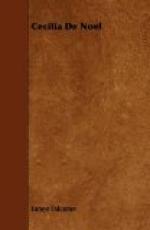“The apostle I liked best,” said Atherley, “was the American one. I really admired old Stamps, and old Stamps admired me; for she knew I thoroughly understood what an unmitigated humbug she was. She had a fine sense of humour, too. How her eyes used to twinkle when I asked posers at her prayer-meetings!”
“Dreadful woman!” cried Lady Atherley. “Lucinda brought her to lunch once. Such black nails, and she said she could make the plates and dishes fly about the room, but I said I would rather not. I am thankful she does not want to bring this baron with her.”
“I would not have him. I draw the line there, and also at spiritual seances. I am too old for them. Do you remember one I took you to at Mrs. Molyneux’s, Lindy, five years ago, when they raised poor old Professor Delaine, and he danced on the table and spelt bliss with one s? I was haunted for weeks afterwards by the dread that there might be a future life, in which we should make fools of ourselves in the same way. What is this?”
“It is the carriage just come back from the station. Mr. Lyndsay and the little boys are going over to Rood Warren with a note for me. I hope you will see Mr. Austyn, Mr. Lyndsay, and persuade him to come over to-morrow.”
“What! To dine?” said Atherley. “He won’t come out to dinner in Lent.”
I thought so myself, but I was glad of the excuse to see again the delicate, austere face. As we drove along, I tried to define to myself the quality which marked it out from others. Not sweetness, not marked benevolence, but the repose of absolute spiritual conviction. Austyn’s God can never be my God, and in his heaven I should find no rest; but, one among ten thousand, he believed in both, as the martyrs believed who perished in the flames, with a faith which would have stood the atheist’s test;—“We believe a thing, when we are prepared to act as if it were true.”
Rood Warren lay in a little hollow beside an armlet of the stream that waters all the valley. The hamlet consisted of a tiny church and a group of labourers’ cottages, in one of which, presumably because there was no other habitation for him, the curate in charge made his home. An apple-faced old woman received me at the door, and hospitably invited me to wait within for Mr. Austyn’s return from morning service, which I did, while the carriage, with the little boys and Tip in it, drove up and down before the door. The room in which I waited, evidently the one sitting-room, was destitute of luxury or comfort as a monk’s cell.
Profusion there was in one thing only—books. They indeed furnished the room, clothing the walls and covering the table; but ornaments there were none, not even sacred or symbolical, save, indeed, one large and beautifully-carved crucifix over a mantelpiece covered with letters and manuscripts. I have thought of this early home of Austyn’s many a time as dignities have been literally thrust upon him by a world which since then has discovered his intellectual rank. He will end his days in a palace, and, one may confidently predict of him, remain as absolutely indifferent to his surroundings as in the little cottage at Rood Warren.




